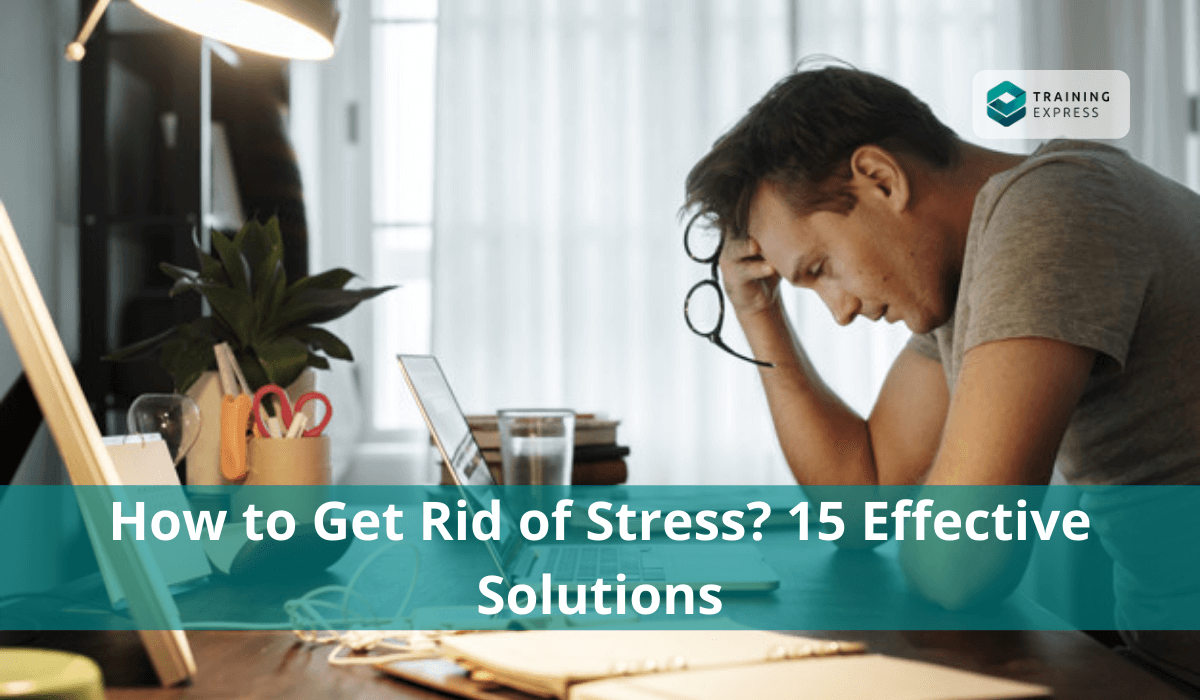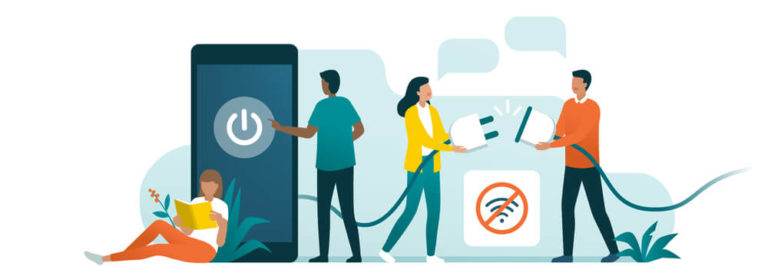
Workload, paper works, deadline, future, studies, financial problems, insecurities, health issues, COVID-19, and it goes on and on. On today’s date, you do not need a specific reason to be stressed. It seems like something is always there to trigger our stress level. That is why you should know how to get rid of stress on your own.
In the 2018 record of the UK, 74% of people had an anxiety attack or felt overwhelmed because of stress. According to a survey of 2020, the percentage of work-related stress was 79% which was 20% more than in 2018.
We cannot precisely define stress as a whole, but we know it is there. When we feel emotionally and mentally down, we just want some rest in the middle of all the noises and activities around us. We feel tired to the bones. All of these indicates we are stressed. With some effort on your part, you can always keep some stress at bay.
Here in Training Express, we came up with 15 effective ways to say goodbye to unwanted stress.
What is Stress?
Stress is our body’s reaction to feeling immense pressure physically and mentally when we have too much on our plate. It is the moment where you feel angry, frustrated or nervous because of some kind of thought or action that is bothering you. Conditions like increased workload, financial problems, relationship problems, illness etc., can leave you tensed and wired up.
Stress has a sequential or cascading effect, which means when we are under stress for one reason, other reasons can also fuel it up and increase our pressure. One stress builds over another. Sometimes we are unaware that we are stressed.
In our fast-paced life, we go through too many things. Our to-do list is never-ending, and there are so many things that we want from our life. In the end, there is so much a human brain and body can take, so we stress. Stress leads to several mental and physical changes as a body responds.
The thing about stress is that it is normal human behaviour to sudden changes, challenges or demand. There are two main types of stress:
Acute Stress
The stress that is short-termed is Acute Stress. We can quickly recover from acute stress if the factor contributing to the stress is not a regular event. You may feel it when your car suddenly has a hard break, or you have a busy day at work, or when you get into a small fight with your friend or partner. Acute stress also happens when you try something new or exciting. Everyone can have it.
Chronic Stress
Chronic stress is long term stress that larks around us for more than we want to. When factors that contribute to stress become a regular event in your life, this may cause chronic stress. The elements can be an ongoing financial problem, a toxic relationship, problems with the job, etc.
What are the Causes of Stress?

Stress is an innate part passed on to us just from the time humans started to evolve. Stress was a human instinct that kept them out of danger during hunting. But we are out of any kind of direct life threats now. Before, the primary human factor that used to cause stress in humans was hunting and finding safe shelter for surviving day to day. With the evolution of human nature, environment and technology, many factors contribute to stress. Now different people have different kinds of stress factors. Why you become stressed can depend on:
1. Perception of the situation– This is connected to your thought process of how you take problems and challenges. Like do you see them positively or negatively? Your perception also depends on your experience and self-esteem.
2. Stress depends on how much experience you have when you handle a particular type of pressure.
3. Your behaviour and emotional boundaries while dealing with stressful conditions.
4. Then numbers of stressful situations or pressures you are dealing with at a time.
5. Your supporting system like friends and family.
Some overall reasons for stress:
- Going through lots of pressure
- Worrying about something
- Transitional period or going through significant changes
- Feeling you have no control over a situation and its outcome
- From being static in life by not having enough work, activities or changes
- Responsibilities that you find overwhelming or hard
- Times of uncertainty.
Some reasons for stressing depending on the situation and condition:
- Going through lots of pressure
- Too much work at the office
- Not satisfied with your work or job
- Doing long hours of work
- Working in a dangerous condition
- Insecurities regarding getting a promotion or, worse, getting terminated.
- If you are facing discrimination, harassment and an unsupportive working environment
- Loss of job or no job
- Relationship problem or Divorce
- Financial crisis
- Getting married
- Having kids
- Chronic illness or injury
- Emotional problems such as depression, anxiety, low self-esteem, anger, grief, guilt,
- Taking care of an old or sick family member
- Psychosocial stress and physical stresses due to trauma, surgery, and different medical disorders
- Living in a high crime area
Our stress level also increases with things that are happening around up but are not directly related to us. For example, we are always watching the news, reading newspapers and remain active on social media all the time. We are aware of how people are being affected by disease or crime in your city or area. One other reason for our stress is social media; there is always competition and fear of missing out. All this thing contributes to our stress directly and indirectly.
How to Identify the Signs of Stress?
Everybody feels stress one way or the other. As we have said, earlier different people behave differently to stress. Furthermore, it has the potential to influence any aspect of daily life, including your feelings, attitudes, cognitive abilities, and physical health. No part of the body is immune from stress. However, since people respond to stress in different ways, stress symptoms may vary. You may feel some stress signs provided below.
- Feelings of constant worry or anxiety
- Concentration difficulty
- feeling overwhelmed
- mood swings
- Unusual sweating
- Irritation or getting angry easily
- Difficulty to relax or breathe
- Depression
- Low self-esteem
- Feelings of nausea or dizziness
- Abnormal eating
- Changes in your sleeping habits, insomnia or sleeping for a long time
- Muscle tension, headache or shoulder pain
- Diarrhoea and constipation
- Loss of sex drive.
- In taking alcohol, tobacco or illegal drugs to relax
What are the Risks of Stress?
In order to cope up with stress, our body goes through hormonal changes. Hormones our body uses to handle stressful situations:
- Cortisol,
- Catecholamines,
- Vasopressin,
- Gonadotropins,
- Thyroid hormones,
- Growth hormone,
- Prolactin,
- Insulin.
All these hormones make our brain more alert, make our muscles tense and increase our heartbeat and pulse. These reactions are helpful to manage stress in a short burst. But when our stress becomes a usual thing and our body continuously alters these stress hormones all the time. These may lead to chronic illness in the long run.
Some illness due to stress are:
1. High blood pressure
2. Tachycardia
3. Heart disease
4. Diabetes
5. Obesity
6. High Cholesterol
7. Depression and anxiety
8. Skin problems like acne and eczema
9. Menstrual Problems
10. Gastrointestinal problems
11. Alzheimer’s disease
12. Accelerated ageing
15 Effective Ways to Get Rid of Stress
Even though stress is sometimes good, we have learned that it is very dangerous in the long run. To be healthy and be happy in our life we have to learn stress management. No matter how challenging our situations are, we have to handle them positively as long as we can. The first steps of getting yourself free of stress must come from within you. Self-help is the initiation, and then you will learn to deal with stress as you go. Below you will 15 helpful ways that can help you get rid of stress.
1. Drink Water

Whenever you feel stressed, the first thing you must do is drink plenty of water at regular intervals. It might seem that this is a mundane solution to the stress level you are feeling, and drinking water will do nothing. But research has proven that drinking water helps relieve stress.
Moreover, sometimes we are stressed because we are dehydrated. Dehydration causes our cortisol level to increase. Cortisol is the main stress hormone, raises blood sugar levels (glucose) and improves glucose use in the brain. This hormone is beneficial in a fight-or-flight situation. But it is not all the time we are in fight and flight situations.
Drinking water keeps the cortisol level low and keeps you away from overstressing. Water helps you relax and stay calm when you become overwhelmed with stress. Drink water every fifteen to 30 minutes, even if you are having a normal day. It is specifically beneficial when you have too much work.
2. Breathing Exercise or Yoga

Breathing exercise helps with overwhelming, stressful situations. You can do breathing exercise anywhere and anytime. Breathing exercise especially helps when you feel stress symptoms like a heartbeat, quicker breathing and constricted blood vessels.
Choose a quiet place, sit down silently and try to breathe. Slowly and deeply exhale and inhale and focus on your breathing pattern. Shut down all the worldly and mental noise and focus only on your breathing. Breathing deeply like this will send signals to your brains to relax and calm down. The brain, in turn, will send your whole body the same signal of calming and relaxing.
Yoga is a great way to relieve stress among different age groups. Several studies have proven that yoga is beneficial in getting rid of stress and anxiety. Yoga is a practice that connects your physical and mental being through breathing and body movement. As a result, yoga helps you get into a peaceful state. It releases happy hormones and keeps your body positive and active. Yoga enhances your mood and sense of wellbeing. You will understand your body and mind by practising mindfulness which is an integral part of yoga.
Furthermore, yoga helps calm our nervous system and relieve symptoms like tension, restlessness, and overthinking. It also keeps the cortisol level low. You can resist stress and also have the ability to control your situation by doing regular yoga.
3. Sleep

If you had a rough day or are too stressed, try to rest or sleep. Our body needs to cope up with whatever hardship is coming our way, and sleeping always helps. You can take a small nap when you feel too much haywire due to stress. After that, you can always go back to your work with a new boost and refreshed mind. Sleep is the most powerful stress reducer.
Moreover, many times, we become more prone to stress when we do not get enough sleep or rest. So ensure that you are having a routine sound sleep of seven to eight hours. Maintaining a consistent sleep schedule calms and rejuvenates mood and sharpens analysing and decision-making ability. When you are well-rested, you are a better problem solver and can cope with stress better.
4. Spend Time in Nature

When you are too worn out and trying to think clearly, be close to nature. Go out in an open space and breathe in the fresh air. Take everything around like the plants, the smell of flowers and soil and sounds of birds and water and reflect in the vast blue sky. It might sound all dreamy, but nature always helps you to heal, soothes, restores and connects our body and mind.
Additionally, being close to nature helps to reduce any kind of stress, fear and anxiety and restore peace of mind and pleasant feeling. Moreover, nature can enhance your well-being by decreasing blood pressure, reducing stress hormones, and stabilising heart rate and muscle tension.
5. Music and Scented Candles

To soothe your mind and calm your body down, music and scented candles can do wonders. Listening to your favourite music can be a great way to unwind yourself from stress.
Firstly, faster music helps you focus and feel more alert. Secondly, upbeat music can boost your mood and make you feel more optimistic about life. Thirdly, slow tempo music will calm your mind and relax your muscles, soothe and provide relief from a day of stress.
Alongside, keeping your surrounding fragrant with mild scents can help you relax and reduce stress. This way of reducing stress or treating your mood is called aromatherapy. It enables you to reduce your anxiety and get better sleep. Some of the scents that can help you calm down are lavender, rose, sandalwood, chamomile, rose, orange and many more scents.
6. Laugh

As silly as it sounds, laugh when you feel stressed. Watch something funny or talk to someone goofy around you. Laughing helps to lighten your body mentally and physically. Laughter stimulates our brain to release endorphins which is a counteracting hormone to stress hormones. A good laugh over something can calm down your stress response by increasing and then decreasing your heart rate, bringing you to a calmer state.
Additionally, it also stimulates the lungs and enhances your oxygen intake. It also relaxes our muscles and helps get rid of stress symptoms.
7. Exercise

A very effective way of getting rid of stress is doing exercise. Physical pressure over your body through exercise will help you realise mental stress. Moreover, people who are doing regular exercise can resist and manage stress better.
Exercise lowers the level of the stress hormone cortisol. In addition, it stimulates endorphins secretion that helps to uplift your mood and helps as a natural painkiller. Exercise enables you to sleep better, which can get hampered by stress and anxiety.
8. Journal your Worries
An excellent way to take hold of your stress is journaling. Writing down about your problem and worries helps you understand them better. Furthermore, you will know what problem you can work on and which issues are not in your hand. The issues that are not in your hands are best left alone and let time decide what will happen. Divert your mind away from them.
Journal all your positive sides and feel it with gratitudes. Thinking about the positive things of your life and writing them down helps you get rid of stress. Making a gratitude list also have a similar effect and help you look at the bright side of your life
9. Try to Get Hold of the Situation.

While some stress factors are entirely out of our hand, there are other factors which we can manage. Take hold of the situation and stress factor that you know you can solve. In fact, you do not have to pile up everything on your plate that comes your way. Learn to say no when you are already busy with one problem. Understand your priority and give preferences to the things that are at the top and under your control. Being selective about your problems will reduce your load and decrease your stress.
10. Spend Time with your Friends and Family

Through stressful times seek your closest friends and family. They will always help with whatever they can. They will also make you understand that in whatever stressful situation you are in, you do not have to deal with it alone.
You are more likely to suffer from depression and anxiety if you have few social connections. Sharing your problems can make you feel lighter. Many of the studies have proven that people thrive when they have a supportive family and social community.
11. Eat Healthily

What we consume every day has a significant role to play in our stress management. Adopting a nutritious diet reduces stress by making your body comfortable, stabilising your mood, reducing blood pressure and improving your immune system. Foods rich in vitamin C, complex carbohydrates, magnesium and Omega-3 fatty acids play a vital role in stress reduction.
Vitamin C helps lower the level of cortisol and other stress hormones and keeps the blood pressure in control during stressful situations. Complex carbohydrate filled foods increase serotonin secretion and keep blood pressure stable and reduce stress eventually. Magnesium helps to avoid headache and fatigue and also improves sleep quality. Omega-3 fatty acids rich food has been proven to reduce the effect of stress hormones and protects you against depression, heart problems and premenstrual syndrome.
Besides, stress also makes us prone to overeat or eat too little. We must maintain a healthy diet to minimise stress and keep our body healthy.
12. Reduce use of Social Media

Social media is an excellent way of connecting with people, looking into the whole world and getting instant news. But it has also become a major reason for our stress. It hampers our work and personal life and makes us more judgemental and comparing. We feel like everyone around us is having a perfect life which is not valid. Therefore, social media contributes to increasing our mental stress, and we do that frequently.
To top it all, there is an ongoing blast of news and all the bad things happening in the world, which also negatively impact us. So reducing the use of social media will keep its negative impact at bay. As a result, you will be away from unnecessary stress.
13. Enjoy “Me Time.”

Putting up with work and family responsibilities can take a toll on you and leave you stressed. It is necessary that you find a way to connect to yourself. Try to do things you love like reading, painting, taking long walks, cooking or gardening. Do anything that will divert your mind for a while from the stressful stuff and make you happy. You will find yourself refreshed and will be capable of working out your stressful thing with renewed energy.
14. Try to Avoid Overthinking or Procrastination.

Procrastination and overthinking is our biggest enemy. Overthinking can make an ordinary situation look like a big issue. If you overthink something and look at every outcome, you find yourself inside a never-ending spiral. This drastically reduces our stress and decreases our confidence. Whenever you find yourself overthinking, do not go down the spiral and take hold of the situation.
Set priorities to avoid procrastination and take control of your stress. Do not put things off for later, do each thing in its time and keep yourself organised. We are putting off things and cannot bring ourselves to complete the task. As a result, we go on a guilt trip and suffer from stress as we see every work is piling in front of us at the last moment.
Keep yourself organised and busy with positive thoughts to avoid overthinking and procrastination.
15. Try Supplements

Many supplements help to decrease stress and anxiety. By supplements, we do not mean medicine. You can try having the herbal or natural supplement to keep yourself calm and reduce any stress.
Green tea has proven health benefits and helps to reduce stress and anxiety. Lemon Balm can have antianxiety effects. Ashwagandha, an ayurvedic medicine made from natural elements, is helpful for stress and anxiety.
Consult a doctor or specialist before having any supplements and to find out which kind of supplements can be good for you.
Get into a Better Lifestyle
Often, our stress is a result of the lifestyle we lead. In order to have a happy and active life, we need to make some healthy choices. You need to be conscious about your daily routine, figure out your toxic habits and replace them with positive and healthier habits.
Some of the habits that we can make a part of our routine to have a better and stress-free lifestyle are:
1. Walk at least twenty to thirty minutes a day.
2. Use your feet and take the stairs instead of the elevator as much as possible.
3. Participate in social and leisure activities so that you can enjoy your free time without being lazy.
4. Eat healthily, avoid junk foods and replace them with fruits.
5. Get into a routine sleep and have it in the right amount, around seven to 9 hours.
6. Follow your passion and do things you love to do.
7. Enjoy time with children, pets or join a sports club. This will feel your body and mind with positive energy and give a self-esteem boost.
Say Goodbye to Stress
To conclude, we cannot always wholly avoid a stressful situation. Neither can we stay calm through it even if we want to. But it is always in our hands how to manage our stress. You have got access to fifteen effective ways to get rid of stress. Each of the fifteen ways will not only help you to get rid of your day-to-day stress; they will also help you to manage stress in the long run.
Check into our Diploma course on Stress and Anger Management. A CPD accredited course will help you rise in the relevant professional field.
Read more on our blog
- Lots of Likes on Instagram: How You Can Quickly Increase Popularity
- Why You Should Use Photo Background Removers For Mobile Devices
- Maximizing ROI: 11 Strategies For Efficient Advertising Spend
- How to Keep Your Data Safe While Applying for Jobs: 6 Tips
- Take Mac Classes to Transform Your Design Profession
- Exploring the landscape of e-commerce hosting
- Personal Branding For Executives: 7 Tips For Maximum Impact
- Transformative Technologies in Senior Living Homes: A Glimpse into 2024
- Continuous Learning: Navigating the Ever-Evolving Landscape of Software Development
- Challenges and Solutions in Implementing Auto Replenishment for Small Businesses
- Available Courses
- Career Bundles72
- Animal care5
- Law8
- Quality Licence Scheme Endorsed111
- Teaching13
- Teaching & Academics Primary27
- Accounting & Finance Primary30
- Training3
- Design9
- IT & Software43
- Healthcare124
- Marketing31
- Health and Safety400
- Construction48
- Electronics25
- Hospitality22
- Health and Social Care219
- Child Psychology37
- Management370
- Business Skills268
- First Aid70
- Employability264
- Safeguarding75
- Food Hygiene103
- Personal Development1273
 Food Hygiene
Food Hygiene Health & Safety
Health & Safety Safeguarding
Safeguarding First Aid
First Aid Business Skills
Business Skills Personal Development
Personal Development







